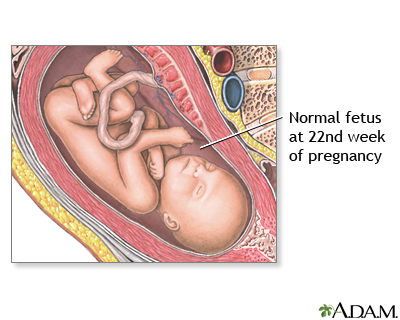| ||||||||||||||||||||||||||||||||||||||||
Welcome to Week 22

Your Baby: The Eyes Have It
Your baby weighs about 12 to 13 ounces (350 g) and measures 7.5 to 8 inches (19 cm) in length. Your baby is really starting to look like a baby now! Baby's senses are becoming more defined and taste buds are formed. Also, nerve endings have developed enough that baby's hands can feel things. Baby is more active, and eyebrows and eyelids are now complete.
Your Body: A Is for Anemia
What is it? Anemia occurs when you have too few red blood cells. This means that your body must boost its iron stores to help produce red blood cells. In your pre-pregnancy state, you needed about 15 milligrams (mg) of iron a day. Thanks to your growing fetus, you now require about 30 mg.
How is it diagnosed? At your first prenatal visit, your health care provider does a blood test to detect anemia. Most women pass this initial check for iron deficiency with flying colors. In fact, most expectant mothers start pregnancy with enough iron stores to last until week 20. At this point in your pregnancy, your blood volume increases a lot. With the increased volume, often the hemoglobin (the chemical that carries the iron) in your bloodstream drops, due to the dilution of your blood.
You may be at higher risk for anemia if:
- You have severe nausea and vomiting early in your pregnancy
- You are carrying more than one baby
- You are not getting enough nutrients and are not taking an iron supplement
- You have had another baby relatively recent to this pregnancy
- You have a genetic disorder that causes anemia
Symptoms of anemia may include:
- Feeling very tired all the time
- Shortness of breath
- Dizziness
- Exhaustion
However, these symptoms also often occur normally as a result of pregnancy. So it's not easy to know you have anemia from these symptoms alone.
Severe anemia increases the risk of pregnancy problems, such as prematurity, low birth weight, and stillbirth. Even mild anemia is risky because all women loose a fair amount of blood at delivery. So it's not good to start out with low blood counts.
Your best bet is to avoid anemia during pregnancy by taking your prenatal vitamins, and any iron supplements your health care provider recommends.
On a Different Note: Looking Into Labor and Delivery
With 22 weeks down and 18 more to go, it's time to start thinking about labor and delivery. Learn about the stages of labor to understand the in's and out's (and do's and don'ts) of the birthing process.
Weekly Tip
Iron can be tricky for your system. To make sure that your body absorbs enough of this important mineral, take your iron pills with your morning OJ or other vitamin C-rich foods. Steer clear of caffeine, which blocks iron absorption. If your iron supplement makes you constipated, talk to your provider about safe ways to stay regular.
|
Review Date:
8/20/2019 Reviewed By: LaQuita Martinez, MD, Department of Obstetrics and Gynecology, Emory Johns Creek Hospital, Alpharetta, GA. Also reviewed by David Zieve, MD, MHA, Medical Director, Brenda Conaway, Editorial Director, and the A.D.A.M. Editorial team. |



